Welcome to the world of goat nutrition and feeding schedules! As a beginner, it’s essential to understand the basics to ensure the well-being of your goats. This blog will provide you with simple and accurate information on how to meet their dietary needs, including proper feeding schedules, essential nutrients, and expert tips. Let’s get started!
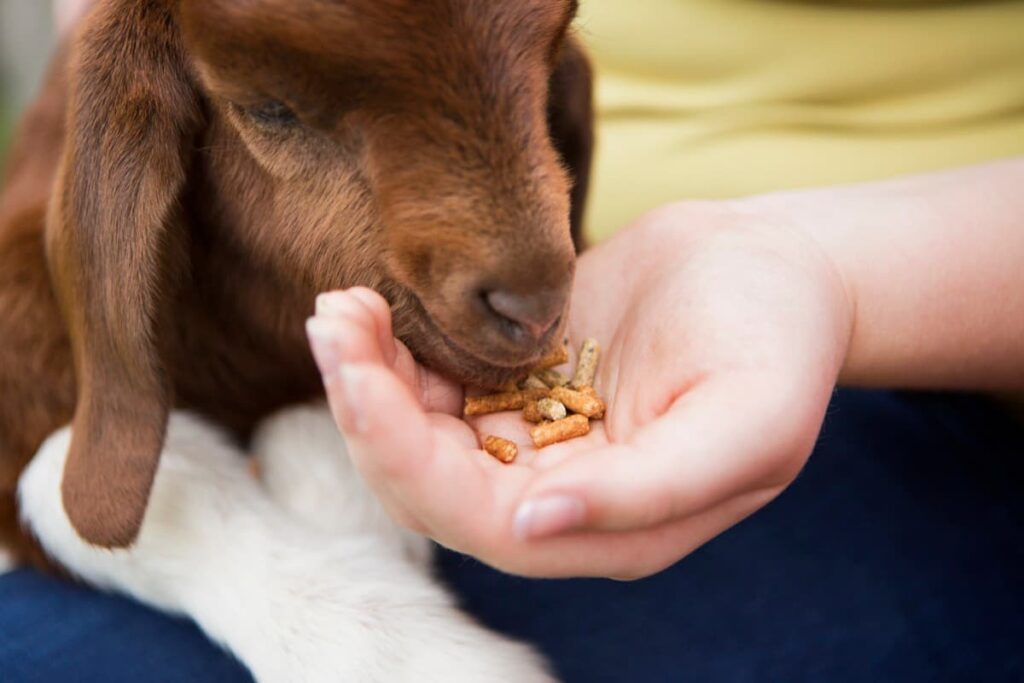
What is Goat Nutrition and Feeding Schedule?
Goat nutrition refers to the dietary needs of goats to support their health and productivity. A proper feeding schedule is crucial for their well-being. Goats are ruminant animals and require a diet that consists of high-quality forage, such as grasses and legumes. They also need access to fresh water and mineral supplements.
Feeding goats should be done multiple times a day, with a consistent schedule. Their diet should be balanced, providing nutrients like protein, carbohydrates, fats, vitamins, and minerals. Consulting with a veterinarian or livestock nutritionist can help create a specific feeding plan based on the goat’s age, weight, activity level, and reproductive status.
High Protein Goat Feed for Optimal Nutrition
- Goats need a high-protein feed to meet their nutritional requirements. Consider protein sources, quality forage, nutrient balance, feed analysis, age and purpose, and consultation with a veterinarian or animal nutritionist.
- Protein sources include soybean meal, alfalfa meal, sunflower meal, cottonseed meal, and dried distillers grains. Forage is an important diet part and can contribute to protein intake.
In case you missed it: Goat Farming Project Report: Investment, Profit for 10, 20, 50, 100, and 500 Goats
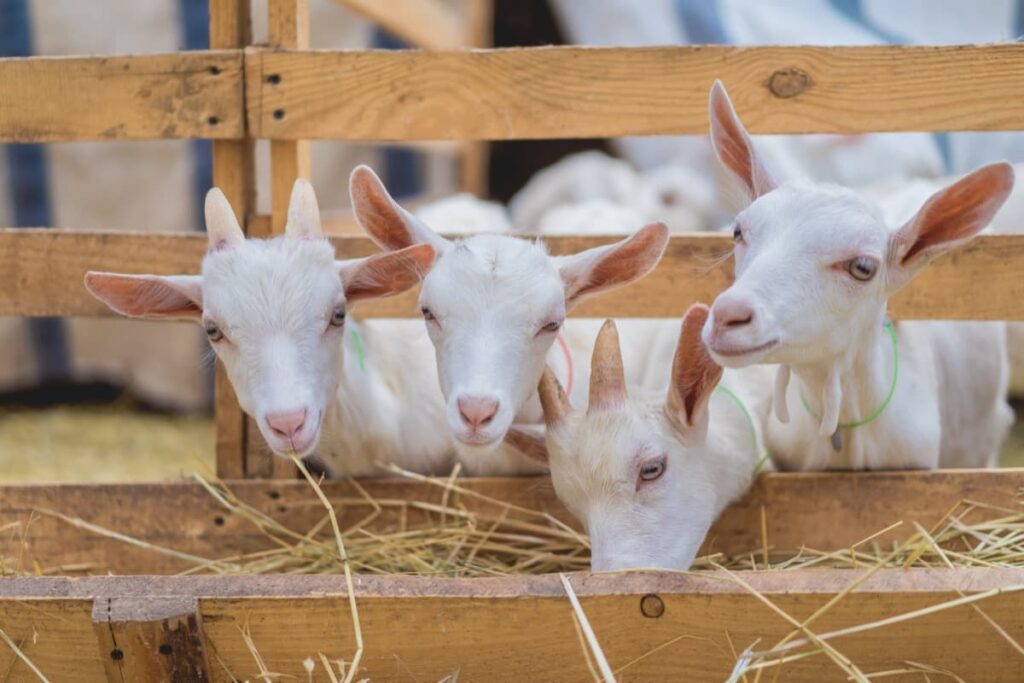
Mineral Supplements for Healthy Goat Diet
- When it comes to providing mineral supplements for a healthy goat diet, goats require several key minerals. Calcium is essential for bone and muscle development and proper nerve and muscle function.
- Phosphorus works in conjunction with calcium for skeletal development and overall growth. Magnesium is important for nerve function and preventing grass tetany. Selenium is a trace mineral with antioxidant properties.
- Copper is necessary for red blood cell formation and iron absorption. Zinc supports the immune system and overall health.
- Iodine is important for thyroid function and metabolism. Iron is required for hemoglobin production and oxygen transport.
- Consultation with a veterinarian or an animal nutritionist is recommended to determine the appropriate mineral supplementation plan for your goats.
Balanced Grain-To-Hay Ratio for Goat Nutrition
- The optimal grain-to-hay ratio for goat nutrition can depend on various factors such as age, weight, breed, activity level, and overall health.
- However, as a general guideline, a balanced diet for goats usually consists of: roughage (hay): Good quality grass hay, such as timothy, Bermuda grass, orchard grass, is commonly used.
- Concentrates (Grains): Grains and concentrates provide additional energy and essential nutrients.
- A common recommendation is to provide about 10-20% of the total diet as concentrates. It is important to note that sudden changes in diet can lead to digestive issues in goats, so any dietary changes should be introduced gradually over several days to allow their rumen to adjust.
In case you missed it: How to Make Silage for Livestock: Business Plan, Preparation Process for Goats, Sheep, Pigs, and Cows
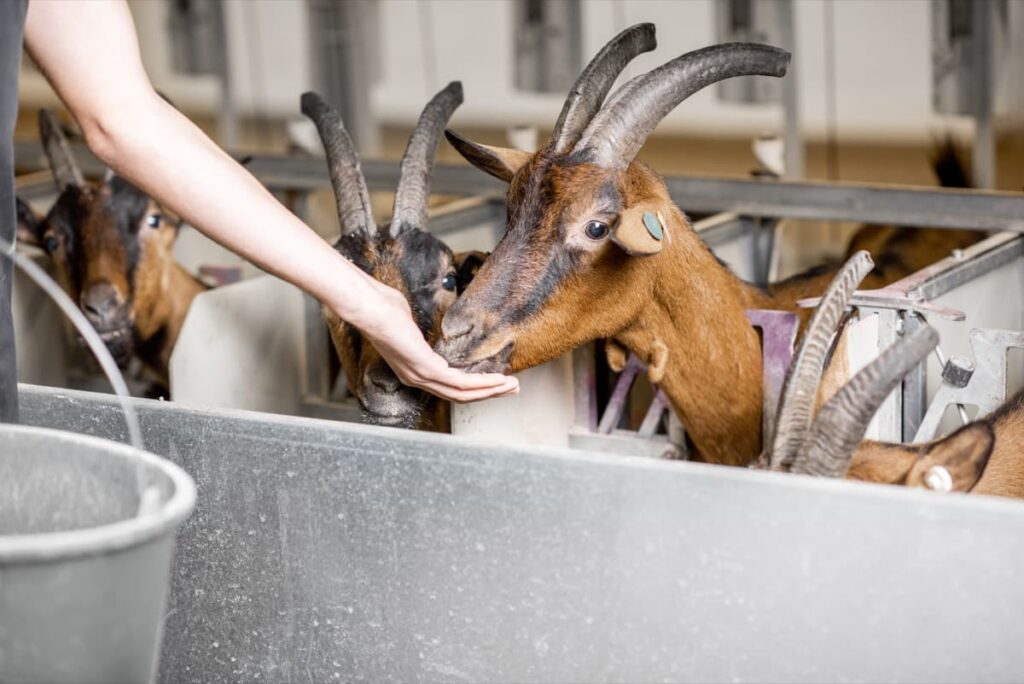
Importance Of Fiber in Goat Feeding
- Fiber is an essential component of a goat’s diet and is crucial to their overall health and well-being. It promotes proper rumen function, helps maintain a healthy pH balance, and prevents digestive disorders like acidosis or bloat.
- It acts as a carrier for other essential nutrients during the digestion process. It slows down the passage of feed through the digestive system, allowing sufficient time for nutrient absorption in the small intestine.
- Preventing ruminal disorders: Insufficient fiber intake can disrupt the microbial balance in the rumen, potentially causing ruminal acidosis or other rumen-related disorders.
- Proper rumination and dental health: Fiber provides the necessary bulk for rumination, helping goats maintain good dental health. Metabolic health and weight management.
- Fiber-rich feeds have a lower energy content and provide a feeling of fullness, which reduces the likelihood of overeating.
In case you missed it: How to Start Goat Farming in Bangladesh: Business Plan, Breeds, Cost, Profits, and Requirements
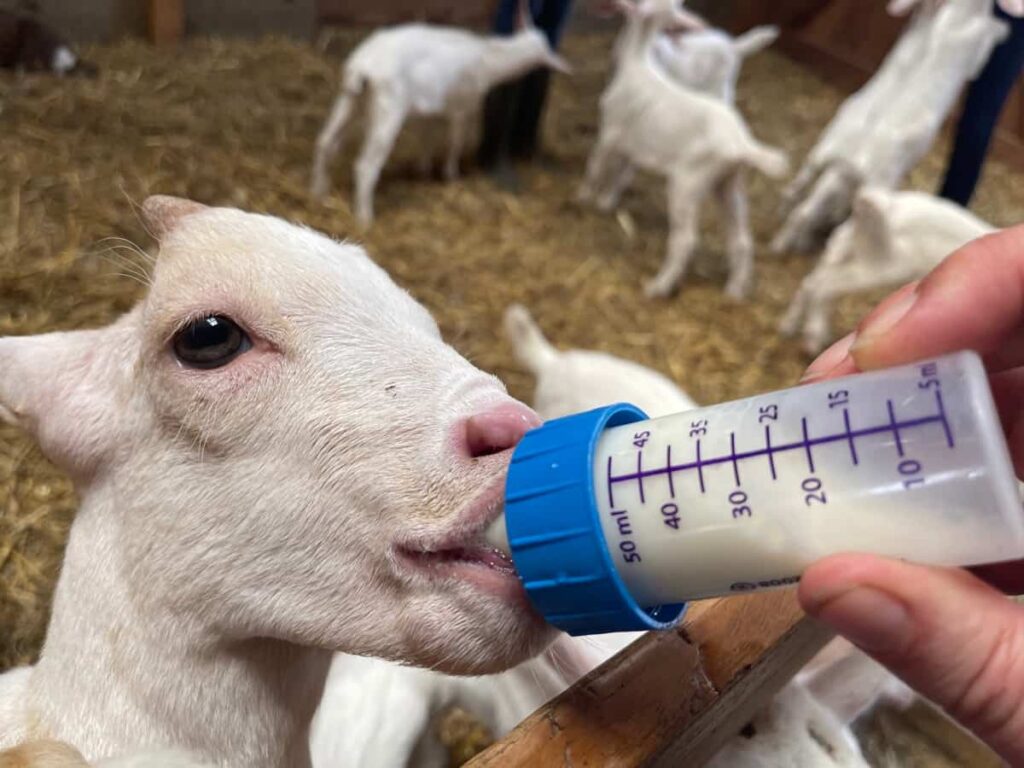
Vitamin-Rich Feed for Strong Goat Immunity
- To provide a strong immune system for goats, it is important to ensure they receive a well-balanced diet that includes essential vitamins. To do this, goats should have access to good-quality forage, sprouted grains and legumes, supplements, and mineral blocks.
- Forage includes fresh grass, hay, or legumes like alfalfa, which provide a range of vitamins, including vitamins A, E, and certain B. Fodder includes sprouted grains and legumes, which are highly nutritious for goats.
- Vegetables and fruits include leafy greens, carrots, sweet potatoes, pumpkins, and fruits like apples, oranges, and berries.
- Supplements may be necessary if the forage and vegetation available in the goat’s environment are deficient in certain vitamins. Mineral blocks are essential for overall health and proper nutrient absorption.
Goat Feeding Schedule for Maximum Growth
- For the first few days, newborn goats should receive colostrum, followed by milk replacer or dam’s milk. For the next two weeks, the transition to solid feed is introduced.
- Milk or milk replacer intake is reduced to twice a day for the next three months. Solid feed is provided with good-quality hay, browse, and a formulated grain or pelleted feed for six months.
- Solid feed is provided with good-quality hay, browse, and a formulated grain or pelleted feed for twelve months.
- For twelve months, solid feed is provided with good-quality hay, browse, and a formulated grain or pelleted feed suitable for mature goats. Regularly assess the goat’s body condition score and adjust the diet to maintain optimal body condition.
In case you missed it: How to Care for Dairy Goats: Shelter/Housing, Fencing, Feeding, and Disease Control
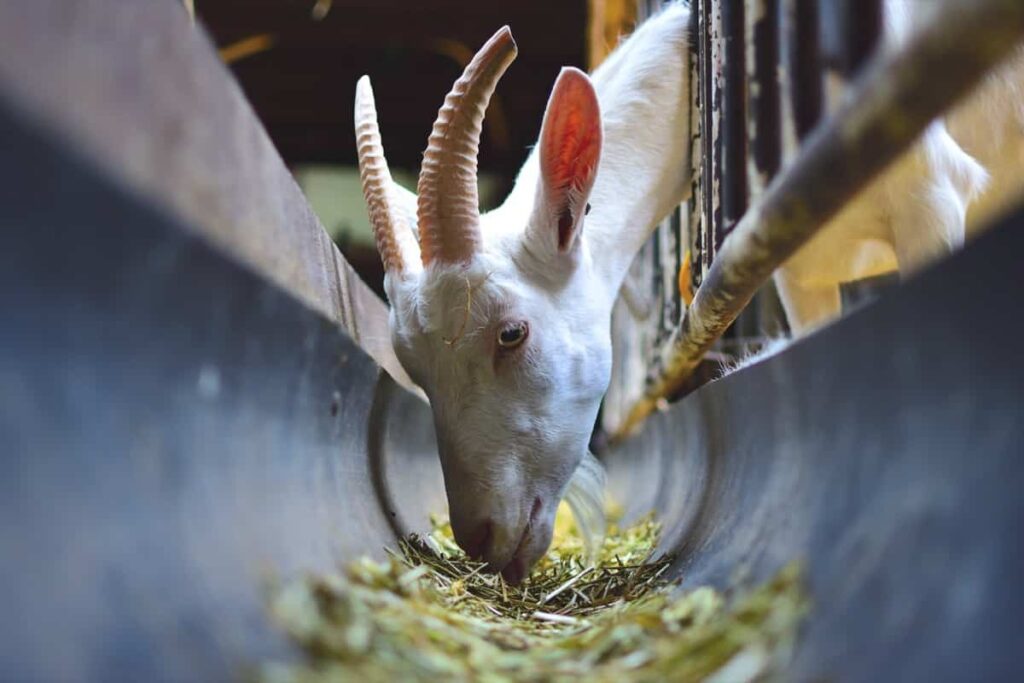
Calcium Supplements for Strong Goat Bones
- Calcium supplements can be beneficial for goats to support strong bones and overall skeletal health. Young growing goats, pregnant or lactating dogs, and older goats must ensure adequate calcium intake.
- Considerations regarding calcium supplements for goats include consulting a veterinarian and a balanced diet that includes high-quality forage, calcium-rich feed, mineral supplementation, and calcium carbonate supplements.
- It is important to strike a balance and provide the appropriate amount of calcium based on the goat’s age, stage of life, and overall health.
- Regular veterinary care and consultation can help goats receive the right nutritional support for strong bones and overall well-being.
Managing Copper Intake in Goat Nutrition
- Managing copper intake in goat nutrition is essential because goats are highly susceptible to copper toxicity. It is important to analyze the forage and soil to manage copper intake, understand copper requirements, balance mineral supplementation, and use chelated copper sources.
- Analyzing the forage and soil will help determine the copper levels in the goat’s primary food source.
- Balanced mineral supplementation is necessary for most goat diets, but it is important to avoid excessive copper supplementation.
- Chelated copper sources are more bioavailable and better absorbed by goats than inorganic ones. Chelated copper is bound to organic compounds, making it easier for goats to utilize.
- Monitor water sources for copper content, avoid copper-rich feedstuffs, and regularly assess copper status. Separate copper-sensitive animals if you have a mixed herd. Regular blood tests can help adjust the copper supplementation accordingly.
In case you missed it: Common Goat Diseases, Symptoms, and Treatment: Check How this Guide Helps Goat Farmers
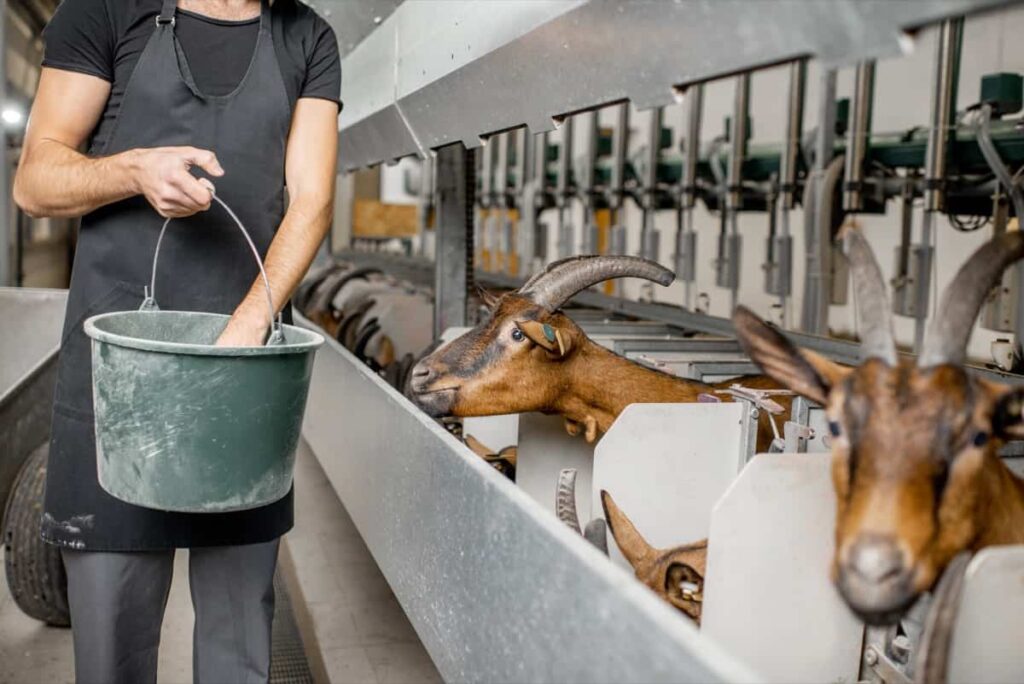
Goat Feeding Tips for Lactation Does
The most important details for feeding lactating goats, also known as does, are to provide a balanced diet, provide high-quality forage, supplement with grains and concentrates, provide fresh, clean water, provide mineral and salt supplements, gradually increase feed intake, divide feedings into multiple feedings, observe body condition, and periodically test forage quality.
Good-quality forages such as alfalfa, clover, or grass hay should be the foundation of a lactating doe’s diet. Supplement with grains and concentrates, provide fresh, clean water, provide mineral and salt supplements, gradually increase feed intake, divide feedings into multiple feedings, observe body condition, and periodically test forage quality.
Feeding Newborn Kids: Colostrum and Milk Replacers
- Colostrum, the first milk the mother produces after giving birth, is crucial for the child’s health and development. Milk replacers are specially formulated powdered products that mimic the composition of natural milk.
- A general guideline for feeding newborn kids with colostrum and milk replacers is to receive colostrum from their mother within the first few hours after birth.
- If the mother cannot provide colostrum, they can seek colostrum from another lactating goat or consider using commercially available colostrum substitutes. After the initial colostrum feeding, they can transition to milk replacers if necessary.
- Follow the general instructions on the product packaging for mixing the milk replacer with warm water. Newborn kids require frequent feedings, usually every 2-3 hours, and should be fed in a clean and sterile bottle or bucket with a nipple or teat designed for small ruminants.
- Gradual weaning can be introduced as the kid grows, and good hygiene practices are essential to prevent the spread of diseases.
- The specific recommendations for feeding newborn kids may vary depending on individual circumstances and the advice of a veterinarian.
In case you missed it: Contract Sheep Farming in India: Companies, Agreement, Profits, How it Works and the Pros and Cons
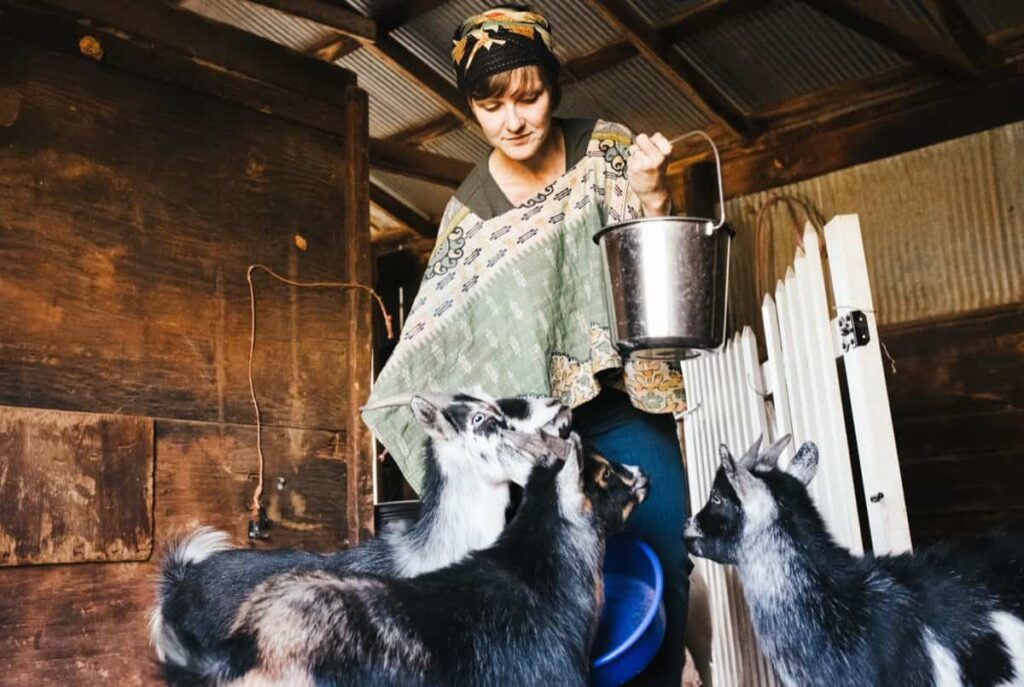
Natural Forage Options for Pasture-Based Goat Nutrition
Regarding pasture-based goat nutrition, several natural forage options can be beneficial. These include grasses such as Bermuda grass, Timothy grass, fescue, ryegrass, and clover; legumes such as alfalfa and clover; browse plants such as blackberry, raspberry, honeysuckle, mulberry, and sumac.
Forbs and weeds such as dandelion, plantain, chicory, thistle, and nettle, and tree leaves and shrubs such as willow, poplar, maple, oak, sweet gum, and black locust. It is important to consult with local agricultural extension services or experienced goat farmers in your area to determine the most appropriate forage options for your pasture-based goat nutrition.
Conclusion
Goat nutrition and feeding schedules are essential for ensuring the health and well-being of your goats. Forage and pasture, concentrates and supplements, water, feeding schedule, monitoring body condition, mineral and salt blocks, gradual diet changes, and regular veterinary check-ups are all important.
- Aquaponic Farming at Home: A Step-By-Step Guide
- Profitable Village Farming Business Ideas in 2024
- High-Yield Aquaculture: Fast-Growing Fish for Farming
- Effective Fish Pond Construction Techniques for Beginners
- Irrigation and Water Management in Pineapple Farming
- Blossom to Harvest: Mastering Flowering and Pollination in Papaya Farming
- Pig Fattening Essentials: From Selection to Sale for Beginners
- Raising Wagyu Cattle: A Complete Guide for Premium Beef Production
- Soil Types and Their Water Holding Capacity
- Optimizing Irrigation Schedules for Coconut Groves for Enhanced Yield
- Espresso Your Garden: Coffee Grounds for Healthier Acid-Loving Plants
- The Best Soil Mix for Snake Plants: How to Mix Your Own Snake Plant Soil
- Green Thumb Success: Expert Tips for Cultivating Greenhouse Beans All Year Round
- Bloom All Year Round: The Ultimate Guide to Indoor Hyacinth Care
- Eco-Friendly Gardening: How to Make Liquid Fertilizer from Kitchen Waste
- Ultimate Guide to Grow Anise in Pots: Explore Seed Propagation to Harvesting
- Guide to Raising Chester White Pigs: Discover Breed Facts to Growth Management
- Mastering the Elegance: The Ultimate Guide to Weeping Cherry Tree Care, Planting, and Maintenance
- Ultimate Guide to Planting Garlic in Grow Bags: Growing Strategies for Beginners
- How to Fix Spider Plant Leaf-Related Problems: Natural and Organic Remedies
- 10 Reasons Why Your Tulsi Plant is Shedding Leaves: Home Remedies and Solutions
- Optimizing Growth and Yield: The Advantages of Palm Bunch Ash Fertilizer
- Utilizing Neem Oil Extract as a Natural Pesticide for Hydrangea
- From Soil to Harvest: Various Ways in Which Farmers Can Use AI Tools
- Steps to Encourage and Induce Citrus Flowers: A Comprehensive Guide
- How to Fix Snake Plant Leaf-Related Issues: Natural and Organic Remedies
- Transform Your Garden into a Fragrant Oasis with Raat Ki Rani (Night Blooming Jasmine)
- Discover the Ideal Chicken Breeds for Philippine Farms
- How to Create a Poultry Egg Farm Business Plan for Profits
- Grow Lemon Cucumbers Like a Pro: Insider Techniques for Bountiful Yields
- Ultimate Guide to Caring for Your Pink Princess Philodendron: Tips for Thriving Variegation
- Areca Nut Profit Per Acre: Calculating Yield and Cost of Cultivation
- How Kaveri Chicken is Becoming a More Profitable Breed in Indian Backyards
- Transform Your Barn: 9 Steps to Convert a Horse Stall into a Chicken Coop
- Exploring Suffolk Sheep Disadvantages with Limitations and Challenges
- Guide to Solving Potted Lemon Tree Problems: How to Revive Lemon Tree in Containers
